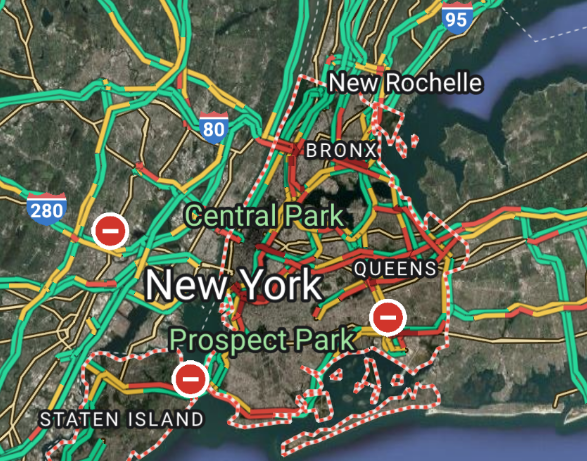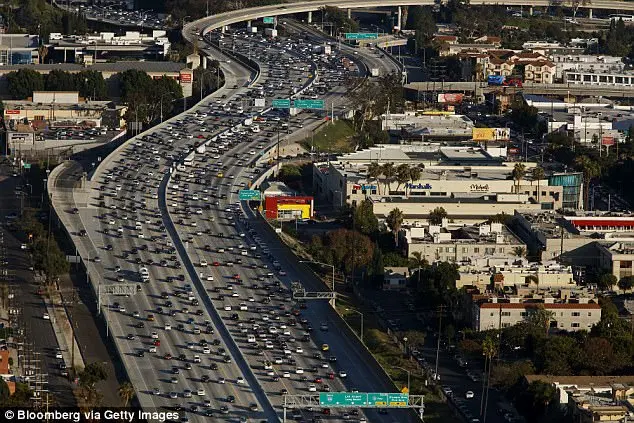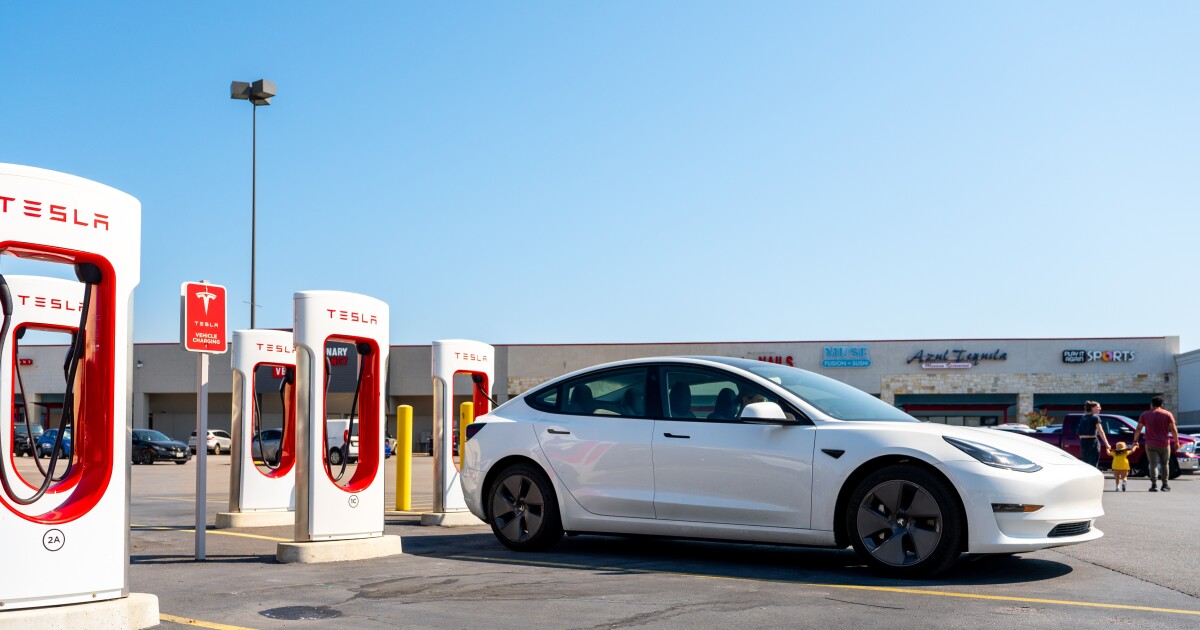Everyone knows that electric vehicles are supposed to be better for the planet than gas cars. That’s the driving reason behind a global effort to transition toward batteries.
But what about the harms caused by mining for battery minerals? And coal-fired power plants for the electricity to charge the cars? And battery waste? Is it really true that EVs are better?
The answer is yes. But Americans are growing less convinced.
The net benefits of EVs have been frequently fact-checked, including by NPR. "No technology is perfect, but the electric vehicles are going to offer a significant benefit as compared to the internal combustion engine vehicles," Jessika Trancik, a professor at the Massachusetts Institute of Technology, told NPR this spring.
It’s important to ask these questions about EVs’ hidden costs, Trancik says. But they have been answered “exhaustively” — her word — and a widerange of organizations have confirmed that EVs still beat gas.
Public transportation is even better yet
And when we actually get that going I’ll stop making sure I always have a car available.
yay for privilege I guess but we can’t all do that
Can’t all use public transportation? I don’t know what you read up there, but I’m in favor of it, I just don’t think we’re ever going to do it. We’ll bring back corporate owned worker’s barracks with corporate scrip before we actually give ourselves good public transportation.
No. The other thing.
Ah okay.
For inner city folk yes.
The US used to have an incredibly comprehensive rail network, combined with street cars in every town. This “public transit is only for cities” nonsense is pro car propaganda.
I used to live outside a town of 3,000 people. Prior to the 1950s it had a trolley that would take you to the 15 miles to the nearest city, and from there you could catch a train to go pretty much anywhere.
You can still have public transit/trains on suburban areas. See Germany or the Netherlands.
Or Japan, or China, or South Korea, or Italy, or Argentina, or Lancaster PA, or parts of New Jersey even. Fuck man so many places have public transit.
How I’m imagining public transportation in Lancaster, PA:

I mean close but instead think a fleet of like 20 bus routes that spread out in every direction for miles and miles into suburbs and farmland. And the buses have real time GPS tracking.
But otherwise very similar.
Japan beats everyone.
Its not a “you can” problem. Its a “we don’t” problem. I cannot get to work on time (7am) using the only public transport we have (bus) in a county with a million people. Also would take about 1.5hrs longer than by car. to be 15m late (assuming the bus is on time) every day. puts it around 4 hours travel to/from work, so work takes up ~12 hours of your day.
deleted by creator
The trip length is certainly an issue but bosses in the US need to be more on board their workers arriving when the bus system can reasonably get them there instead of demanding a ~25,000 dollar investment just to get to work.
Saw a rural bus system working perfectly fine in South America. If they can figure it out, so can we.
deleted by creator
Even just taxes. I pay taxes. I’d like to breathe less shit from all the commuters and have all the people I depend on at their work. This aversion to taxes in the US is terminal unless we get rid of it.
The only valid criticisms of EV’s are:
-
They’re harder to extinguish than a gas car if they end up catching on fire.
-
They don’t really solve any of the major issues with car based infrastructure.
-
Tesla is a shit show because of that damn muskrat which pushes a lot of people away from EV’s in general.
They are heavier and accelerate faster than an equivalent ICE vehicle on the same frame, and so result in more pedestrian fatalities.
They are heavier and accelerate faster than an equivalent ICE vehicle on the same frame, and so result in more pedestrian fatalities.
I lump that in with part of the major problems of car based infrastructure but that’s still fair to point out.
All else being equal
They’re harder to extinguish than a gas car if they end up catching on fire.
Yeah that is gonna be a bigger problem than most people imagined.
To be fair, no consumer vehicles have 900 kWh batteries haha.
My firefighter neighbour told me that the procedure now is just to let them burn, like they do with gasoline fires. They make sure it doesn’t spread, but they won’t try to extinguish it because it’d take 10-12 hours and thousands of gallons. By just letting it burn they’re done in an hour with a few hundred gallons.
They don’t steal a lot of data too? Or this privacy nightmare affected gas car too?
It’s an issue in newer cars in general.
-
Put them in a sealed room with a gas engine running and you’ll see how fast they realize that they’re cleaner
Fair, but the first rebuttal is going to be “go into a sealed room with a coal fire burning”
… how is that an argument?
The argument is that all you’re doing is moving the carbon emissions from the car directly in your vicinity to the coal-fired power plant a long distance away. Move that same coal-fired power plant into the sealed room, and suddenly it’s no longer far away, and the “unclean” nature of the electric car, so the thought process goes, becomes obvious.
That’s the thought process if you just stop thinking when you get to a point that reaffirms one’s biases. If you continue down that train of thought you’d realize it’s a lot easier to regulate and monitor the emissions of a coal power plant than it is every single car on the road. Plus you don’t need to use coal to make electricity.
I’d happily hang out in a sealed room with a nuclear reactor.
Isn’t the whole point that the gas engine equivalent is just in somebody else’s room though?
In any case, I’ll take whatever partial climate wins we can get.
Solar, wind, and nuclear energy: are we a joke to you?
Even if we assume all the electricity is coming from carbon sources (there’s no need for any of it to be carbon sources) it’s still more efficient because power plants are way better at turning that chemical energy into electricity. Even with the losses in the lines, charging, and in your motors, electric cars are still significantly more efficient on a mile per kg CO2 basis than gas cars. Throw some solar panels on your roof and they become essentially carbonless.
It’s really easy to understand why too. You completely waste most of the heat energy you produce in IC engines. They’re incredibly inefficient and always will be.
Yeah, what is it, 70% energy lost to heat in an ICE?
Cleaner than gas cars =/= Clean.
This is the lowest possible bar to pass. The point isn’t that EVs are worse than gas. The point is that both are terrible for people, health, safety, climate, transit, sustainability, equity, freedom, etc.
Wut. Cars have legitimate uses.
EVs dont only not pollute wherever they drive, but overall are probably around 70% efficient if including the power generation, while gas is 40% or less.
The others, I think you are projecting US problems to the whole self-owned transportation sector.
So what’s your plan? Ban cars? Good luck.
deleted by creator
It’s not that public transportation is for the poors, it’s that it is inconvenient. I used to ride the metro every day to work when I lived in DC and it added an extra hour vs driving. I didn’t mind as I could chill and read a book or listen to music but it was extra time.
When I moved to Portland I could take the bus to work because my house and job were on the same route so it was only about 5 minutes more than driving. Now I’d have to take 2 buses, or walk a mile to the bus stop on the same route as my work. Either option would turn a 10 minute drive into an hour commute each way. I don’t have that kind of extra time when I work 12 hour shifts and come home on my lunch break to walk the dog. I assume people with kids have even more of a time crunch.
We have plenty of public transport here.
I’d still need a car because I do a lot of hiking and I carry a lot of stuff to and from work
“hurr de durr, it’s not fully clean, derp”
Ok Trumper
deleted by creator
Genuine question - are EVs better for the environment if the main source of electricity of my country is coal based? Most of the coal plants are pretty old too…
Yes, whether your electric plant is coal, natural gas, or honestly even if it was diesel. Larger engines are more efficient than smaller ones. It’s been a long time since I broke down the math over 10 years so my information is probably wildly out of date but even 10 years ago when you broke down the math charging an EV from a fossil fuel plant of any kind was still ultimately more efficient than a gas car in the long term.
Couple that with the ability of many EV now to also act as a battery for your house and that just goes wildly into the EVs favor if you utilize that for peak demand offset. Which many people could do easily even if it meant not having their battery fully charged in the morning when they go to leave for work because let’s face it very few people drive more than 60 miles full round trip in a day so even with their battery at say half they would have more than enough for their whole day plus extra.
deleted by creator
Yes the MIT link covers coal. At worst it’s on par with gas cars. They get better as the energy source mix does but they aren’t worse than gas powered cars.
It’s pretty simple really if you look at commuter traffic. Each stopped electric vehicle does nothing while stopped.

Aside from heating or cooling the occupants, that is.
Yeah, compare 500w heating to 30kw starts. But it does matter if you’re gonna be there eternally for 8 hours or something. Heating is inefficient when you’re not doing something else with the water before hand.
Somehow instead of having a GPS app tracking traffic to top off the batteries before you get there, I much rather have an app try to convince me to park my car, take a bus and try again tomorrow.
Yes you can get the emissions per equivalent kilowatt hour of both. Especially since there are many electric generators that are just using a car engine. And it’s a known fact that at least in terms of energy generation larger motors a better conversion rate of fuel to electricity and power plant Motors are quite a bit larger than most cars. Unfortunately I only really have my phone available to me at the moment and I’m a little busy so I don’t have time for much more than these quick replies but over the next couple days if I get a moment I will come reply to this again after finding the actual figures if you haven’t already found them yourself which please do reply to this with them if you find them
The “break even” point is still somewhere around 150k miles for big batteries (above 75 kWh). And while there are many EVs that have 200k on their first battery, that isn’t necessarily the status quo for most of them. A simple lump of Aluminum or Cast Iron takes a lot less energy to make and can even be produced completely renewable If you factor in synthetic fuels, things look even more grey - especially with algae, there can be huge benefits growing algae in sea water (see the Arctic Algal Boom and the connected pytho plankton growth). BEVs are not “THE” answer, they are one answer to specific questions.
Not only that, the issus (environmental, child labour, etc) with rare earth elements are still not solved and the environmental damages through lithium mining are not something to just sweep under the rug.
Or maybe 13,500 miles. But what’s a few zeros between friends?
Argonne assumes the batteries are produced with renewables AND they assume EVs are going to be charged over the day, when most of the renewable energy is “present”. Most BEVs are charged over night, where only Hydro or Geothermal makes power. Meaning, the Co2 footprint grows exponentially, because at night most of the power is made with fossile fuels - a kWh easily can have a rucksack of over 700 gr/kWh of Co2. But hey, what’s a few assumptions here or there in favour of either side, huh? Oh and go talk to China about them producing the batteries “environment friendly”. Just because something uses less Co2 doesn’t mean it’s cleaner. A few ppm more Co2 in the Atmosphere is bad for the Climate, sure, but a few ppm more Mercury in natural habitats, rivers and lakes? Pff, who cares!
A recent study from the Association of German Engineers did factor in that most EVs are charged over night - even after 130k Miles (~ 200k km), a Golf TDI has roughly a 33 Ton Co2 rucksack, where an EV produced with renewables (ID.3) had 36 Tons.
“Most BEVs are charged over night, where only Hydro or Geothermal makes power”
Maybe in Iceland; anywhere with wind and nuclear power, this really is not the case.
And in most areas, how much share have nuclear and wind? Somewhere around 30-40% combined on average
About 30% in Europe/US; half that in China.
Electricity consumption drops sharply during the night - when wind power typically peaks. There are power companies that offer substantially cheaper rates at night for charging EVs for this very reason.
So something a swappable and universal battery design would solve that would allow lithium to be phased out by sodium batteries and would allow the usage of only the amount of batteries you’d actually need. So why are you against that as well? Or just BEVs in general?
Who said i’m against that? But with that argument, phasing out fossile fuels would solve a lot more issues than a few EVs.
Yes. That’s the entire point here. The answer is yes.
deleted by creator
Even if your energy comes from coal they’re still more efficient.
deleted by creator
By insisting on perfect, you are preventing incremental change.
Incremental change would have been fine in the 1970s when the world should have instituted it, including incrementally reducing industry to absolute necessities like medical products, and individual developed world quality of life, to find homesotasis with our only habitat.
Now it’s smash the factories today, and accept the hundreds of millions dead breaking those poisonous supply chains, including possibly ourselves, for humanity to have any non-nightmarish future on a planet we terraformed to be hostile towards Human life for the next couple million yers.
But having absolutely failed to institute incremental change half a century ago despite warning, and absolutely failing to take drastic action now that we are just beginning to feel our irreversible fine work, our species clearly and resolutely chooses no future/nightmare susbsistance future, or at the very least there wouldn’t be a pop figure/pointless plastic crap factory left standing in the world. 🔥🤷♂️🔥
What I find the most ridiculous is what we’re doing: resolutely choosing death by actions, while still strangely preaching hope for a future. WuT a weird fucking species we were.
Automotive tires are a leading source of microplastics so EVs aren’t exactly a darling angel
Could we not just make tires out of a different material?
Yes and no.
Yes it’s possible. No it’s not scalable or affordable.
Synthetic plastics (all plastics for the purposes of this conversation) are byproducts of the petroleum industry. They’re making gas out of oil and are left over with plastic precursors so those get made into something and everyone wins* because the materials are basically free.
Last I looked we were creeping up on two billion tires a year.
it’s not just capitalism, the US is a very spread out place compared to most other countries. if you want everyone to use mass transit you’re asking them to either 1) move into the city for similar commute times, or 2) spend an inordinate amount of time riding busses around the suburbs for the same distance commute. Neither are good solutions.
And also we have solved the “getting to work” debate with teleconferencing. why should we need cars or an even bigger mass transit system when most people can simply work from home?
if you want everyone to use mass transit
That’s the point, nobody wants to move people in the middle of nowhere to buses. Everyone wants these people to move to buses:

That’s like a half-full train’s worth of people if they single-seat, which they do, or 5-10 buses.
Imagine how cooler the place would be if that 16 lane road would be a 2 lane train track.
Eh there are plenty of places that have less population density than the US but they do just fine with transit. It might be true that most US cities are poorly designed for transit, but the density isn’t a the reason.
Someone has to see Not Just Bikes. Capitalism was the driver to the sub-urbanization process made after WW2 in the US, as a national economic policy to orient growth around building detached houses, private cars and suburban infrastructure (and secondary security considerations of reducing losses and damage in case of nuclear bombs in cities). The US was not a '‘very spread out’ place before WW2 (i.e. for the vast majority of its history), in fact cities like San Francisco were world leaders in mass transit, and trains were the axis of transportation of both people and goods (even existing suburbs were connected to trains, in whatever shape and size they come). The us cities spent and spend an enormous amount of money and debt to pay for all the road infrastructure, that even neoliberals say it’s not economically sustainable, and that money can also be better used paying for higher quality mass transit, not the tertiary thought they give it now (horrible buses that stay in traffic with the cars for the poor people that can not afford a car). Most people do not work remote all the time, even flexible / hybrid workers need to transport themselves some trips per week. Not to mention that full remote work may over time trickle to foreign countries that do the service cheaper, and the work remaining onshore is work that the owners need-want at least hybrid or on site workers.
The US was not a '‘very spread out’ place before WW2
no kidding, the population was also like a third of what it is now.
in fact cities like San Francisco were world leaders in mass transit, and trains were the axis of transportation of both people and goods (even existing suburbs were connected to trains, in whatever shape and size they come). The us cities spent and spend an enormous amount of money and debt to pay for all the road infrastructure,
yeah, mass transit within cities is a great idea and should be used as much as possible. I am not shitting on the general idea of mass transit. what I’m saying is, in the context of a practical daily commute, mass transit only works to a point, and a LOT of people live beyond that point.
Most people do not work remote all the time, even flexible / hybrid workers need to transport themselves some trips per week.
again, I’m not saying mass transit should never be used. what is the cost:benefit for the infrastructure to cover out to the suburbs? how much time is added to very long trips, and are people willing to deal with that?
Over the longterm, and they also require a lot less maintenance because they don’t have to deal with mini-explosions from combustion generating excess heat and stress. The problem is in the battery, and the industry hasn’t even scratched the surface for solutions.
I see trucks carrying butane tanks all the time, where are the trucks carrying EV battery replacements? There aren’t because the industry wants to charge extra for fixed installation ones depending on capacity and charging capacity and there is absolutely no profit incentive that offsets other losses to standardize battery systems in a way they can be easily extensible or replaceable.
I see trucks carrying butane tanks all the time
That’s not the equivalent to battery replacements but to the power grid, which of course is yet another win for EV (since clearly distributing the energy source for vehicles over the power grid is safer and more environmentally friendly than needing huge trucks to carry it).
(I’d say battery replacements are closest to motor replacements in gas cars in terms of costs and effort. What about the environmental impact? -> That’s why it’s so costly. To mitigate environmental impact.)
Battery replacements really are not difficult, I’d seriously recommend not imagining obstacles where there are not.
Without special installations, charging takes several hours instead of a quicker battery swap (which you could take with you as extra weight). DC chargers cannot even be installed at how home due to their requirement. Swappable batteries are possible and would make EV cars adaptable to new and different battery technology, they are just not designed that way.
Some, like the XBus, talked about allowing it, and it is perfectly possible, it just isn’t going to come out of traditional car manufacturers who had to be dragged to develop anything EV or manufacturers like Tesla who want to make range a subscription feature. Let’s not even go into EV range extension trailer systems, which would be as effortless as swapping trailers.
So, just so you know, the average EV battery weighs 1000lbs, and some all the way up to 2000lbs in something like the EV hummer. (Unnecessary I know). The cost to have a battery in an EV replaced currently sits around $5000 to $15000 off of warranty. So there are definitely obstacles. Along with letting the general public fry themselves trying to hook up a 400v battery. You’re not dealing with AA batteries. Battery technology is far away from something able to swap out yourself with the ease you may be thinking of.
So, just so you know, you can purchase 96V batteries that weigh less than 30 kg and can be connected in series to provide well over 400V, and if you want more range you can install bigger ones. EV ones weight that much because of the range, which is less of a factor if they can be swapped. They are made up of cells which are individually far below 400v, and there are standardized Anderson connectors that can safely connect and disconnect +600V and are used all the time. The cost of a battery is a non-factor is you are just renting them like you are sort of expected to do with butane tanks. 50V is the limit where you usually begin receiving a shock at, but 400V is not really considered high voltage and can be easily handled with the proper connectors and failsafes, like not swapping with a load.
It’s better than letting the general public fry themselves trying to fuel their cars with an ignitable combustible.You are not dealing with rubbing alcohol. /wildscaremongering
Battery technology is something I’m constantly swapping out for myself with ease, but that’s because I don’t make my own mental blocks. So do owners who retrofit gas cars to EVs. My goal is to retrofit an older EV car so that I don’t have to pay around $5000 to $15000 of overpriced proprietary batteries. It is a long-term goal, but be happy, it is not one that could be shared because the only way to do so would be in a society open to it.
Please let me know how that goes for you and when I can purchase one that allows me to travel 500 kilometres in -25°C without disabling the vehicle mid trip in that mentioned temperature.
You mean for your highly specialized need that the majority of potential EV drivers currently turned off by the step costs don’t need? Sure, let me just make a note, since the solution is scalable, even working in the energy demand of a heater.
Ah yes, I am the only person on the planet who has a need to travel occasionally to a larger city during a normal winter. Got it!
This is already the present; we have power tools that already swap batteries on the fly. The problem is more complex as you add batteries and charge, but not insurmountable. I see the first application in truck fleets.
The problem is that in those cases it is still a proprietary market.
Where are the trucks carrying the replacement petrol tanks for ICE cars?
You can get them at Amazon: https://www.amazon.com/s?k=gas+tank
You aren’t making a point if you are trying to equate the distribution network for gas, which is so ubiquitous that there is no need for the sort of trucks that distribute butane tanks to EV batteries, which require specialized facilities for fast charging, which also deteriorates batteries faster, or otherwise take half a day of charging. EV battery swapping bans already exist for things like scooter rentals.
There are already standarized sizes, voltages, and ports using in autocaravans which could be connected in series ideally through BMS to provide the voltages EV cars would need and would even be simpler through already prepped trailer systems. Four 96V batteries (can go up to six) in series connected safely through Andersen connectors would be enough for a basic EV car, that’s less than 30kg LiFePO4 each, making it swappable on the spot, less dangerous than lithium, and open to a large market of providers.
Its about 40% more power efficient per mile but theres a couple of other trade-offs, still better yeah.
Because the conservative machine, despite the love of Elon’s right-wing antics, never stop talking about how bad EVs are. Funny, the only time they act like they care about the environment is when they talk about how bad the EV batteries are to manufacture. While they roll coal and drive gas-guzzling mall cruiser bro-dozers all over the place.
Give him a few years into a potential Trump victory, and he will make Tesla to manufacture petrol cars.
Because we Americans are easily swayed by propaganda, unfortunately.
zombie engineer voice “traiiiiiins”
can you really blame us?
let me run through the last 8 years of American history with four words, “we were lied to”. doesn’t matter from whom, doesn’t matter what. we’re constantly being lied to. truth is, it’s been true for longer than 8 years, but the last 8 have been especially transparent.
we’re learning that the upper echelon only trusts the American public to do three things; consume, produce, and die. if you can’t even do that for them, you’re removed as an undesirable.
so yeah, trust in the system is broken. it’s going to take at least a generation or two just to repair it ** if they work on it**.
I can’t fault anyone who’s untrusting of a system that continuously covers lie after lie with more lies.
8 Years?
How long did fossil fuel companies know about climate change?
How long did the fuel industry know about the effects of leaded petrol?
How long did cigarette companies know about links to cancer?
How long did pharma companies know about opioid addiction risk?
How long did social networking companies know about psychological manipulation?
How long did the sugar lobby know about their links to diabetes and obesity?
How long did the manufacturing companies know about PFAS and microplastics?I would say you have always been lied to.
Your forgot that plastic manufacturing knew it wasn’t recycled or recyclable.
I can’t fault anyone who’s untrusting of a system that continuously covers lie after lie with more lies
I can and will. Learn some basic critical thinking skills and apply them. Throwing your hands up and ranting about how “the system is broken” is mopey teenager shit.
Things are far more complicated than your whiny rant. They world is shades of gray rather than the simplistic “bad guy in black / good guy in white” situation that you characterize it as.
You overestimate the general populations intelligence.
Very true.
Lololol, what a fucking worthless right wing rant
lulz jokes on you.
Fuck Trump, fuck republicans.
Not surprising. There has been a pretty successful campaign by the right to paint EVs as worse for the environment because we get our electricity from coal (we barely get anything from coal) and mining; more expensive to fuel up (using the highest priced fast charging vs lowest price of gas); and worse from a humanitarian perspective (cobalt mining).
Things to refute this: EVs, even with coal power as their energy source, emit less CO2 over the lifespan of the vehicle compared with gas vehicles. Mining sucks and is indeed environmentally damaging but oil is also fucking terrible. The benefit of EVs is that the vast majority of a battery can be recycled whereas oil is single use. So to meet a consistent demand, we do have to ramp up mining but once the demands is met, mining can be scaled back dramatically.
For fuel costs, it’s easy to do the basic math but many don’t. I’ve seen people complain that their electricity bill will just skyrocket. When I suggested my parents get a battery powered riding mower, my mom thought they would be more expensive and that the electricity bill would be just as much as the gas bill. The price of the mower is the same and the electricity cost was about 1/15th of what has is and you don’t have to be riding around in gas fumes.
As for the humanitarian angle, the right obviously does not really give a shit. You could easily point out the atrocities that oil companies have done over the years. You could also point out that cobalt is being phased out. We could also do the mining here instead of having our done abroad. And there is the previous point that most of this just had to be done once then mining can be scaled back.
A venn diagram of Trumpers and people who believe gas cars are cleaner is a circle














